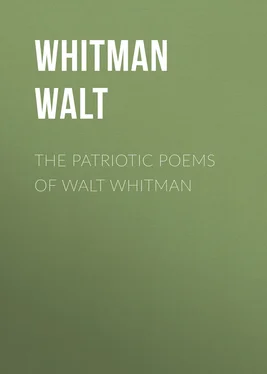Уолт Уитмен - The Patriotic Poems of Walt Whitman
Здесь есть возможность читать онлайн «Уолт Уитмен - The Patriotic Poems of Walt Whitman» — ознакомительный отрывок электронной книги совершенно бесплатно, а после прочтения отрывка купить полную версию. В некоторых случаях можно слушать аудио, скачать через торрент в формате fb2 и присутствует краткое содержание. Жанр: foreign_poetry, Поэзия, foreign_antique, foreign_prose, на английском языке. Описание произведения, (предисловие) а так же отзывы посетителей доступны на портале библиотеки ЛибКат.
- Название:The Patriotic Poems of Walt Whitman
- Автор:
- Жанр:
- Год:неизвестен
- ISBN:нет данных
- Рейтинг книги:3 / 5. Голосов: 1
-
Избранное:Добавить в избранное
- Отзывы:
-
Ваша оценка:
- 60
- 1
- 2
- 3
- 4
- 5
The Patriotic Poems of Walt Whitman: краткое содержание, описание и аннотация
Предлагаем к чтению аннотацию, описание, краткое содержание или предисловие (зависит от того, что написал сам автор книги «The Patriotic Poems of Walt Whitman»). Если вы не нашли необходимую информацию о книге — напишите в комментариях, мы постараемся отыскать её.
The Patriotic Poems of Walt Whitman — читать онлайн ознакомительный отрывок
Ниже представлен текст книги, разбитый по страницам. Система сохранения места последней прочитанной страницы, позволяет с удобством читать онлайн бесплатно книгу «The Patriotic Poems of Walt Whitman», без необходимости каждый раз заново искать на чём Вы остановились. Поставьте закладку, и сможете в любой момент перейти на страницу, на которой закончили чтение.
Интервал:
Закладка:
But the mother needs to be better,
She with thin form presently drest in black,
By day her meals untouch'd, then at night fitfully sleeping, often waking,
In the midnight waking, weeping, longing with one deep longing,
O that she might withdraw unnoticed, silent from life escape and withdraw,
To follow, to seek, to be with her dear dead son.
A TWILIGHT SONG
As I sit in twilight late alone by the flickering oak-flame,
Musing on long-pass'd war-scenes—of the countless buried unknown soldiers,
Of the vacant names, as unindented air's and sea's—the unreturn'd,
The brief truce after battle, with grim burial-squads, and the deep-fill'd trenches
Of gather'd dead from all America, North, South, East, West, whence they came up,
From wooded Maine, New-England's farms, from fertile Pennsylvania, Illinois, Ohio,
From the measureless West, Virginia, the South, the Carolinas, Texas
(Even here in my room-shadows and half-lights in the noiseless flickering flames,
Again I see the stalwart ranks on-filing, rising—I hear the rhythmic tramp of the armies);
You million unwrit names all, all—you dark bequest from all the war,
A special verse for you—a flash of duty long neglected—your mystic roll strangely gather'd here,
Each name recall'd by me from out the darkness and death's ashes,
Henceforth to be, deep, deep within my heart recording, for many a future year,
Your mystic roll entire of unknown names, or North or South,
Embalm'd with love in this twilight song.
A SIGHT IN CAMP IN THE DAYBREAK GRAY AND DIM
A sight in camp in the daybreak gray and dim,
As from my tent I emerge so early sleepless,
As slow I walk in the cool fresh air the path near by the hospital tent,
Three forms I see on stretchers lying, brought out there untended lying,
Over each the blanket spread, ample brownish woollen blanket,
Gray and heavy blanket, folding, covering all.
Curious I halt and silent stand,
Then with light fingers I from the face of the nearest the first just lift the blanket;
Who are you elderly man so gaunt and grim, with well-gray'd hair, and flesh all sunken about the eyes?
Who are you my dear comrade?
Then to the second I step—and who are you my child and darling?
Who are you sweet boy with cheeks yet blooming?
Then to the third—a face nor child nor old, very calm, as of beautiful yellow-white ivory;
Young man I think I know you—I think this face is the face of the Christ himself,
Dead and divine and brother of all, and here again he lies.
YEAR THAT TREMBLED AND REEL'D BENEATH ME
Year that trembled and reel'd beneath me!
Your summer wind was warm enough, yet the air I breathed froze me,
A thick gloom fell through the sunshine and darken'd me,
Must I change my triumphant songs? said I to myself,
Must I indeed learn to chant the cold dirges of the baffled,
And sullen hymns of defeat?
FIRST O SONGS FOR A PRELUDE
First O songs for a prelude,
Lightly strike on the stretch'd tympanum pride and joy in my city,
How she led the rest to arms, how she gave the cue,
How at once with lithe limbs unwaiting a moment she sprang,
(O superb! O Manhattan, my own, my peerless.
O strongest you in the hour of danger, in crisis! O truer than steel!)
How you sprang—how you threw off the costumes of peace with indifferent hand,
How your soft opera-music changed, and the drum and fife were heard intheir stead,
How you led to the war (that shall serve for our prelude, songs ofsoldiers),
How Manhattan drum-taps led.
Forty years had I in my city seen soldiers parading,
Forty years as a pageant, till unawares the lady of this teeming and turbulent city,
Sleepless amid her ships, her houses, her incalculable wealth,
With her million children around her, suddenly,
At dead of night, at news from the south,
Incens'd struck with clinch'd hand the pavement.
A shock electric, the night sustain'd it,
Till with ominous hum our hive at daybreak pour'd out its myriads.
From the houses then and the workshops, and through all the doorways,
Leapt they tumultuous, and lo! Manhattan arming.
To the drum-taps prompt,
The young men falling in and arming,
The mechanics arming (the trowel, the jack-plane, the blacksmith's hammer, tost aside with precipitation),
The lawyer leaving his office and arming, the judge leaving the court,
The driver deserting his wagon in the street, jumping down, throwing the reins abruptly down on the horses' backs,
The salesman leaving the store, the boss, book-keeper, porter, all leaving;
Squads gather everywhere by common consent and arm,
The new recruits, even boys, the old men show them how to wear their accoutrements, they buckle the straps carefully,
Outdoors arming, indoors arming, the flash of the musket-barrels,
The white tents cluster in camps, the arm'd sentries around, the sunrise cannon and again at sunset,
Arm'd regiments arrive every day, pass through the city, and embark from the wharves
(How good they look as they tramp down to the river, sweaty, with their guns on their shoulders!
How I love them! how I could hug them, with their brown faces and their clothes and knapsacks cover'd with dust!)
The blood of the city up—arm'd! arm'd! the cry everywhere,
The flags flung out from the steeples of churches and from all the public buildings and stores,
The tearful parting, the mother kisses her son, the son kisses his mother
(Loth is the mother to part, yet not a word does she speak to detain him),
The tumultuous escort, the ranks of policemen preceding, clearing the way,
The unpent enthusiasm, the wild cheers of the crowd for their favourites,
The artillery, the silent cannons bright as gold, drawn along, rumble lightly over the stones
(Silent cannons, soon to cease your silence,
Soon unlimber'd to begin the red business);
All the mutter of preparation, all the determin'd arming,
The hospital service, the lint, bandages, and medicines,
The women volunteering for nurses, the work begun for in earnest, no mere parade now;
War! an arm'd race is advancing, the welcome for battle, no turning away;
War! be it weeks, months, or years, an arm'd race is advancing to welcome it.
Mannahatta a-march—and it's O to sing it well!
It's O for a manly life in the camp.
And the sturdy artillery
The guns bright as gold, the work for giants, to serve well the guns,
Unlimber them! (No more as the past forty years for salutes for courtesies merely,
Put in something now besides powder and wadding.)
And you lady of ships, you Mannahatta,
Old matron of this proud, friendly, turbulent city,
Often in peace and wealth you were pensive or covertly frown'd amid all your children,
But now you smile with joy exulting old Mannahatta.
SONG OF THE BANNER AT DAYBREAK
Poet
O a new song, a free song,
Flapping, flapping, flapping, flapping, by sounds, by voices clearer,
By the wind's voice and that of the drum,
By the banner's voice and the child's voice and sea's voice and father's voice,
Low on the ground and high in the air,
On the ground where father and child stand,
In the upward air where their eyes turn,
Where the banner at daybreak is flapping.
Интервал:
Закладка:
Похожие книги на «The Patriotic Poems of Walt Whitman»
Представляем Вашему вниманию похожие книги на «The Patriotic Poems of Walt Whitman» списком для выбора. Мы отобрали схожую по названию и смыслу литературу в надежде предоставить читателям больше вариантов отыскать новые, интересные, ещё непрочитанные произведения.
Обсуждение, отзывы о книге «The Patriotic Poems of Walt Whitman» и просто собственные мнения читателей. Оставьте ваши комментарии, напишите, что Вы думаете о произведении, его смысле или главных героях. Укажите что конкретно понравилось, а что нет, и почему Вы так считаете.











